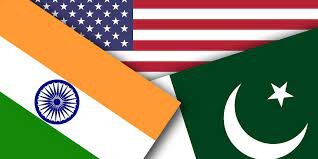India-Pakistan conflict: The long-term impact of US strategy on South Asia

TEHRAN - Western policies, particularly those of the United States, have played a complex and influential role over recent decades in the spread of terrorism and the escalation of regional tensions, especially between India and Pakistan.
These policies, ostensibly aimed at combating terrorism and ensuring regional security, have in practice fueled insecurity and intensified conflicts. The recent Pehlgam incident is a stark example of the consequences of these policies and the intricate security challenges in the region.
The roots of this crisis trace back to the Cold War era when the United States, through "Operation Cyclone," funneled billions of dollars in weapons and financial aid to Afghan mujahideen via Pakistan.
This shortsighted policy, heedless of long-term consequences, strengthened extremist networks in Pakistan, paving the way for the emergence of terrorist groups like al-Qaeda in Afghanistan.
Following the September 11 attacks, U.S. policies in the region failed to curb terrorism. Instead, they exacerbated anti-American and anti-Western sentiments among locals, particularly through drone strikes in Pakistan’s tribal areas that killed civilians.
These actions provided extremist groups with a fertile ground to exploit public resentment, expand their ranks, and further threaten regional security.
Meanwhile, Pakistan, portrayed as a strategic U.S. ally, became a victim of great-power rivalries. The inconsistency and duplicity of Washington’s policies—supporting Pakistan’s government on one hand while turning a blind eye to extremist activities within its borders—undermined governance and fueled chaos.
Recent India-Pakistan clashes, particularly in Kashmir, cannot be analyzed without this historical context.
In an interview with RT on Saturday, Pakistan’s Defense Minister, Khawaja Asif, stated that terrorism in the region is a result of Western policies, especially those of the United States, and that Pakistan has been a victim of these policies. Asif emphasized that “jihad” was created by the West and has deeply impacted Pakistan’s culture and society.
He added that after the September 11 attacks, Pakistan joined the anti-terrorism coalition again, but these wars were not Pakistan’s own, and the country has paid a heavy price.
The defense minister also highlighted the worsening security situation after the U.S. withdrawal from Afghanistan in 2021 and expressed concern over millions of undocumented Afghans in Pakistan, stating that Pakistan itself is the biggest victim of terrorism in the region.
The United States, through its economic and military support for select allies, has often fueled tensions and proxy wars rather than fostering peace and stability. This support, particularly in countries embroiled in sectarian or ethnic conflicts like Pakistan and Afghanistan, has contributed to the rise of terrorist groups.
Moreover, U.S. policies on the international stage, especially regarding terrorism, reveal stark contradictions. While positioning itself as a leader in the fight against terrorism, the U.S. has supported certain groups that sponsor terrorism in the region for strategic interests.
This double standard has consistently strengthened extremist groups, perpetuated armed conflicts, and expanded terrorist threats globally.
Leave a Comment